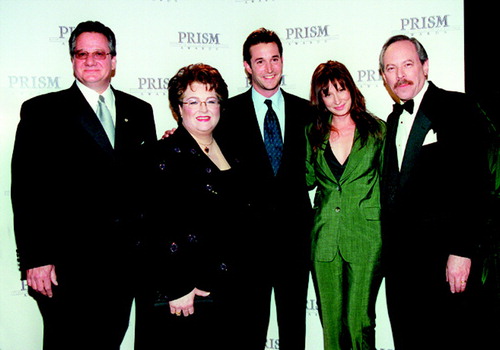TV, Films Honored for Accurate Drug-Use Depictions
A top-ranking U.S. drug enforcement official tries unsuccessfully to fight the war on drugs from above and comes crashing down to reality when forced to save his heroin-addicted daughter from herself. A policeman in Tijuana must either die or become part of a corrupt drug smuggling scheme.
The movie is “Traffic,” and it is just one of this year’s recipients of the Fifth Annual PRISM Awards, which honor the entertainment industry for accurate depictions of drug and alcohol abuse and addiction in TV and film.
 National Institute on Drug Abuse (NIDA) Director Alan Leshner, Ph.D., joined actor Jamie Leigh Curtis and comedian Richard Lewis, who hosted the show in Los Angeles in April, at the awards ceremony.
National Institute on Drug Abuse (NIDA) Director Alan Leshner, Ph.D., joined actor Jamie Leigh Curtis and comedian Richard Lewis, who hosted the show in Los Angeles in April, at the awards ceremony.
“The entertainment industry is the most expensive and probably one of the most effective educational systems in this country,” Leshner told Psychiatric News. “Both children and adults acquire a tremendous amount of knowledge from what they see in the entertainment world.”
The myths about addiction are perpetuated by and overblown in the popular media. Movies and television shows have often glamorized drug abuse, according to Leshner, who cited the 1930s classic “Reefer Madness” as an example of a hyperbolic film that portrays teens who smoke marijuana as spiraling out of control. The film was intended to be a scare tactic to warn people of the dangers of the drug, but it had the opposite effect, according to Leshner. After its release, the film became a cult classic due to its outrageous depiction of drug use.
To encourage the entertainment industry to depict alcohol and drug abuse accurately, NIDA, the Entertainment Industries Council Inc. (EIC), and the Robert Wood Johnson Foundation decided to reward the entertainment world with the PRISM awards.
The movie studios and television networks submit entries to the EIC’s nomination committee, which includes physicians, counselors, researchers, and policymakers. The committee members then cast a vote in each category, such as drama series, talk shows, and soap operas.
At this year’s awards ceremony, which took place at CBS Studios, celebrity presenters included Kelsey Grammer of “Frasier,” Melissa Joan Hart of “Sabrina,” and Noah Wyle of the PRISM award–_winning television series “ER.”
Wyle, who is cast as John Carter, a young doctor with an addiction to painkillers, commented on his role at the awards ceremony. “I didn’t think John Carter was the face of drug addiction. But, upon reflection, I realized that there probably isn’t just one face to drug addiction.”
Accurate depiction of tobacco addiction earned the show “Sex and the City” a PRISM award. Star Sarah Jessica Parker plays a nicotine-addicted woman who is trying to quit smoking. “My character Carrie’s smoking has not been something that we have taken lightly on the show. We. . .felt that it was a rare opportunity to show a likable character with an unlikable habit,” said Parker at the awards ceremony.
NIDA and the EIC presented the first PRISM awards in 1995; the Robert Wood Johnson Foundation joined them three years ago. The EIC alone produces the awards ceremony, however.
At this year’s ceremony, there were 250 nominations and an audience of more than 500 people, including actors and other professionals from the entertainment industry and representatives from NIDA and the Robert Wood Johnson Foundation.
“Hollywood has received the PRISM awards quite well,” said Brian Dyak, president and CEO of EIC.
According to Dyak, EIC offers educational briefings to the entertainment companies, studios, and broadcasting networks. “We sponsor up to 60 briefings per year on drug abuse issues for writers, story editors, and development executives who work on a particular show,” said Dyak.
The PRISM awards ceremony is being syndicated by Tribute Entertainment for broadcast from August 6 to 19. ▪



